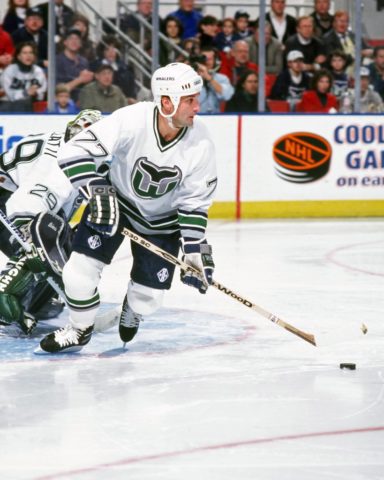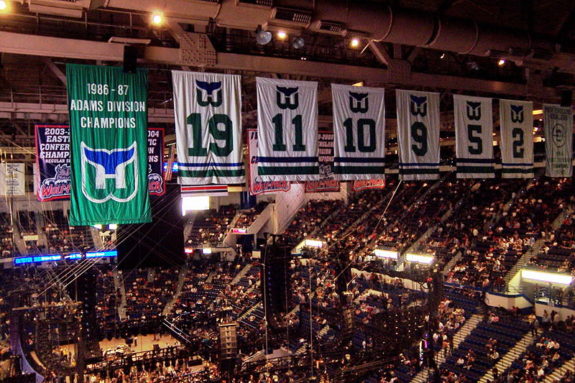Few hockey players have ever been distinguished by a particular sound. One player however, skated so precisely – seemingly as if he possessed the legs of a Clydesdale – that every time he took a stride, the noise of steel cutting through ice resounded throughout the arena from his sheer power alone. There are many who believe that Paul Coffey is the greatest offensive-defenseman to ever play the game. A sizable chunk more would also consider him hockey’s all-time greatest skater too. In his 21 seasons in the NHL he won four Stanley Cups and retired from the game with a whole slew of records, many that still stand to this day.
Retiring partway through the 2000-01 season, Coffey had suited up for nine different NHL teams. Some of the cities where he stopped defined his career more than others. Perhaps more than any other location, Coffey is primarily considered an Edmonton Oiler. That club drafted him as the sixth overall selection of 1980 NHL Draft, and he was integral in garnering their first three Stanley Cups. Coffey would also be well-remembered as a Pittsburgh Penguin, guiding players like Mario Lemieux and Jaromir Jagr in capturing the team’s first Cup in 1991. He would also be recalled with plenty of recognition for his more than three seasons with the Detroit Red Wings – two of those campaigns saw him generate at least 60 assists after being well into his 30s.
One of Coffey’s briefest stops was with the Hartford Whalers. It was a destination where few would surmise he would have ever ended up. In a roundabout way though, his time with the team that bled green gave him one final shot at another Stanley Cup. We take a look back at Coffey’s time spent as a Whaler.
How Coffey Got to Hartford
Though he was 34 years old at the time, the 1995-96 NHL season was still an excellent one for Coffey. In fact, it would be his final season that still showed how great a player he truly was. A premier defender for the Detroit Red Wings at the time, Coffey scored 14 goals and added 60 assists to have 74 points in 76 games. He would finish fifth overall in voting for the Norris Trophy as the league’s Best Defenseman. The season beforehand (1994-95) he had been better than a point-per-game player (58 point in 45 games) and had been paramount in getting Detroit to the Stanley Cup Final where they lost in four straight to the New Jersey Devils. All indications were that Coffey was still an elite blueliner and would continue to be for at least a few more years.
Coffey was so strongly valued that he would become central in a blockbuster trade that saw him leave the “Motor City” for the New England area. The Red Wings sought to revamp their squad with a new recipe in order to make another run at the Stanley Cup. The Hartford Whalers were willing to be dance partners and could not afford to pass up a marquee defender – something they had not had since the days of Mark Howe.
A mere five days after the start of the 1996-97 season, the Red Wings sent Coffey, physical 30-goal scorer Keith Primeau, and the team’s 1st-round draft choice in the 1997 Draft to the Whalers in exchange for 50-goal scorer Brendan Shanahan and defenseman Brian Glynn. Shanahan was quite open during the summer of 1996 that he wanted out of Hartford. Detroit, wanted a rugged winger capable of scoring. During Shanahan’s lone, full season in Hartford (1995-96) he had scored 44 goals and 34 assists for 78 points in 74 games. It was easy to see why the Red Wings wanted him, and they would end up winning three Stanley Cups with him on their roster.
Coffey’s Performance as a Whaler

While the Whalers did not get the same return as Detroit did, on paper it looked as if they would. Primeau would remain with the franchise for three full seasons, including after the team relocated and became the Carolina Hurricanes. Once arriving in Hartford, Primeau finished third on the team in points (51) and second in goals (26) in 75 games for the 1996-97 season. Lo and behold, it would be the final season of the Whalers existence.
That is perhaps the toughest part of this tale to swallow. Whalers fans may have assumed that by obtaining a legendary player such as Coffey and a young gun like Primeau, there would be a resurgence of the franchise that would have avoided any sort of movement by the team. Sadly, this did not materialize. While Primeau contributed quite positively and became a bit of a mainstay, Coffey’s time in Whalers green was very fleeting, and it amounted to a mere 20 games in total. For normal defenders his production during those games would be considered decent or average. In Coffey’s case it was indicative of a decline in his offensive capabilities.
We take a look now at his more memorable performances of his 20 games with the Whalers. Keep in mind that the season prior he had 60 assists and 74 total points. It puts things into perspective.
Oct. 12, 1996: Coffey’s first game with the Whalers was quite lackluster. The Florida Panthers whitewashed Hartford by a score of 6-0. Coffey accounted for one of the 21 shots against the Panthers’ John Vanbiesbrouck, and finished the affair as a minus-2 – one of eight Whalers to post such a stat. To the Panthers credit, they walloped both Hartford goalies, Sean Burke and Jason Muzzatti.
Oct. 30, 1996: In his third game with the Whalers – a showdown with the New York Islanders – Coffey recorded his first point with his new team. Hartford opened the scoring in the first period as Coffey garnered the primary assist on an Andrew Cassels tally. A secondary assist went to Geoff Sanderson. The Islanders would take the lead 2-1, but Hartford managed to tie it up 2-2 early in the third period on a Kevin Dineen power play goal. The game would end as 2-2 deadlock.
Oct. 31, 1996: The very next day on Halloween, Coffey scored his first goal as a Whaler. Going up against longtime hated rival the Boston Bruins, it was Coffey who nearly assured a Hartford victory. With the teams tied 3-3 at the start of the third period, Coffey scored an unassisted goal to put his team ahead 4-3. Unfortunately, at the 17:06 mark, Rick Tocchet knotted the score at 4-4 and the game would end in a tie. Coffey finished the game with two shots on goal and as a plus-one. The Whalers put 37 shots on Bruins goalie Bill Ranford.
Nov. 20, 1996: Coffey played what would be his finest game with the Whalers. At this point in the season, Hartford had a solid record of 10-5-3. Going up against the Montreal Canadiens in Hartford, Coffey led his team to a 3-1 victory. To open the scoring, he and Sanderson set up Cassels for his fifth of the season at 7:39 of the game. Then in the second period, Coffey scored the game-winner on the power play from Dineen and Sanderson. Not surprisingly, #77 would be named the first star of the game.
Nov. 22, 1996: In a wild 7-1 loss to the Pittsburgh Penguins, Whalers goalie Jason Muzzatti gave up all seven goals. Hard to imagine however that the Whalers actually out-shot the Penguins 38 to 37. Coffey tied with fellow Whalers Primeau and Nelson Emerson, as each skater fired six shots on goal. Penguins goalie Ken Wregget earned top honors that night as he turned aside all shots except for one in the third period from Sami Kapanen.

Dec. 11, 1996: As the Whalers defeated the Florida Panthers 5-2, Coffey would score his final NHL points in a Hartford uniform. In the second period of the game the Panthers went up 2-0. It was a different story come the third period though, as Hartford shut the door and scored five straight goals themselves. Coffey scored the fourth goal of the game, with assists to Mark Janssens and Dineen. Then he set up the fifth and final tally of the night, earning the lone assist on a Steven Rice goal. Coffey finished with two shots on goal and as a plus-two. Somewhat surprisingly though, it was Primeau, Gerald Diduck, and Muzzatti who earned the star selections for the game.
Dec. 12, 1996: The following day, on the road in Philadelphia, Coffey would play his final game with the Hartford Whalers. Losing 3-2 to the Flyers, the game was relatively uneventful. Coffey picked up two separate holding infractions in the second period. He finished the night with one shot on goal. He is also likely did not realize that he just lost to the team he was soon to be playing for.
The Trade out of Hartford
Three days after the loss to the Flyers, Coffey was officially traded from Hartford to Philadelphia. It is difficult to decide which team received the better end of the deal. The Whalers gave up Coffey and a third round selection in the 1997 NHL Draft. Meanwhile, the Flyers sent defenseman Kevin Haller, a 1997 first round pick and a seventh round pick to Hartford. The Whalers were seemingly planning for the future, albeit an uncertain one. The Flyers, on the other hand, were envisioning a Stanley Cup.
The move out of Hartford made the most sense for the Flyers. At the time Philadelphia was laden with talent. The “Legion of Doom” line of Eric Lindros, Mikael Renberg, and John LeClair was in full force. Players like Rod Brind’Amour, Eric Desjardins, and Janne Niinimaa were playing at the top of their games. Likewise, the Flyers had assembled an enviable blend of veterans like Dale Hawerchuk, Joel Otto, Michel Petit, Kjell Samuelsson, and Ron Hextall onto the same roster. Squeezing all the remaining talent and skill out of Coffey for the sake of a Stanley Cup made sense.
Unfortunately, though the Flyers made it to the 1997 Stanley Cup Final they would be swept in four straight games by none other than Coffey’s former team the Detroit Red Wings. After coming over from Hartford, he found a bit of a scoring resurgence as he picked up six goals, 20 assists and 26 points in 37 games. Battling injuries late in the playoffs however, Coffey played in only two of the Flyers four games in the Final. Had he been healthy and available, it could have been a different outcome for the Flyers.
All of that being said, in what would be their final NHL season in Hartford, Paul Coffey was briefly a Whaler. In 20 games with the team he scored three goals and added five assists. One of those goals was a game-winner and a power-play tally. Coffey also accumulated 18 penalty minutes and 39 shots on goal. His time with the Whalers was ultimately fleeting but in a roundabout way it gave him one last shot at another Cup.
Furthermore, it shall forever be written in hockey history that Paul Coffey was a Hartford Whaler.